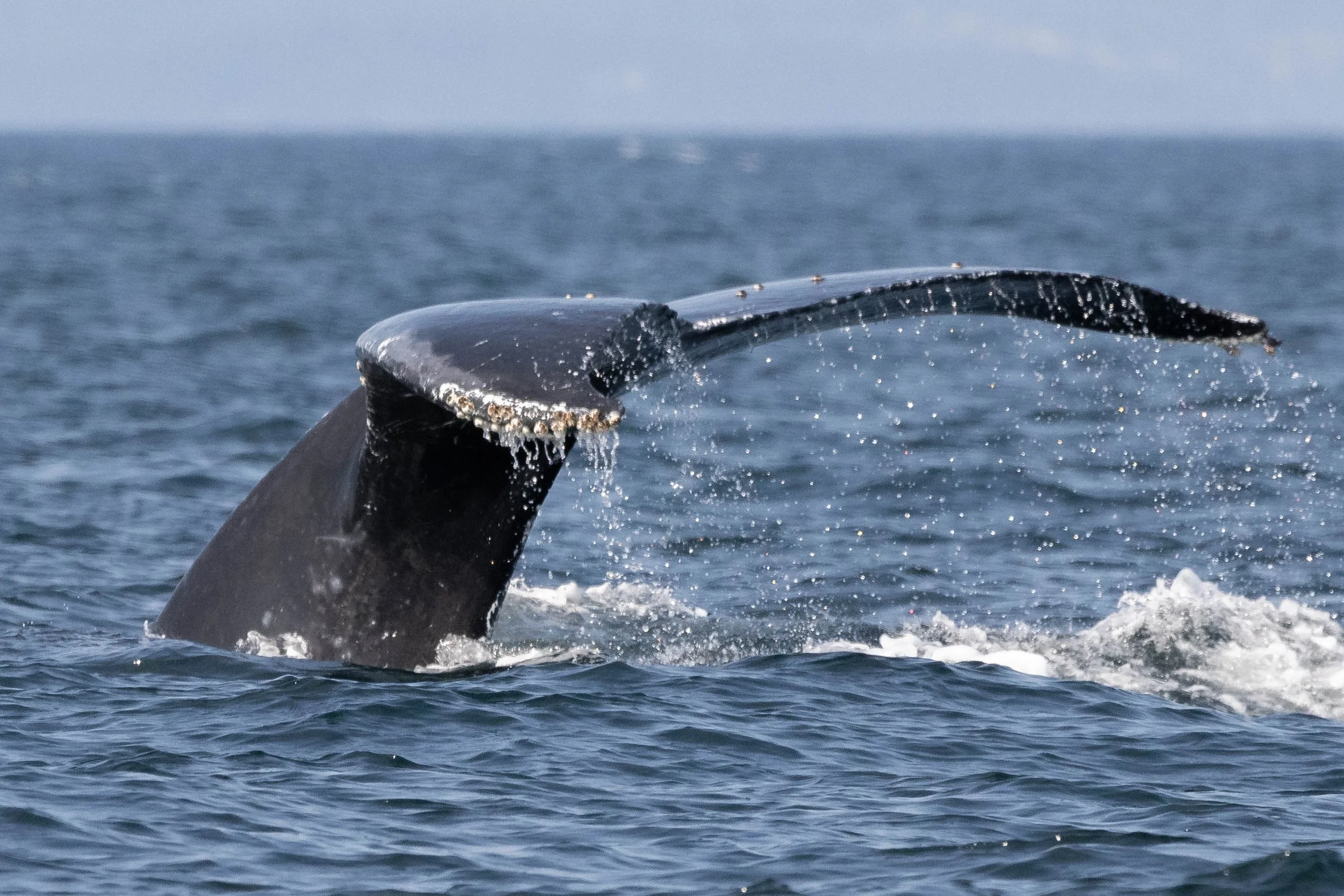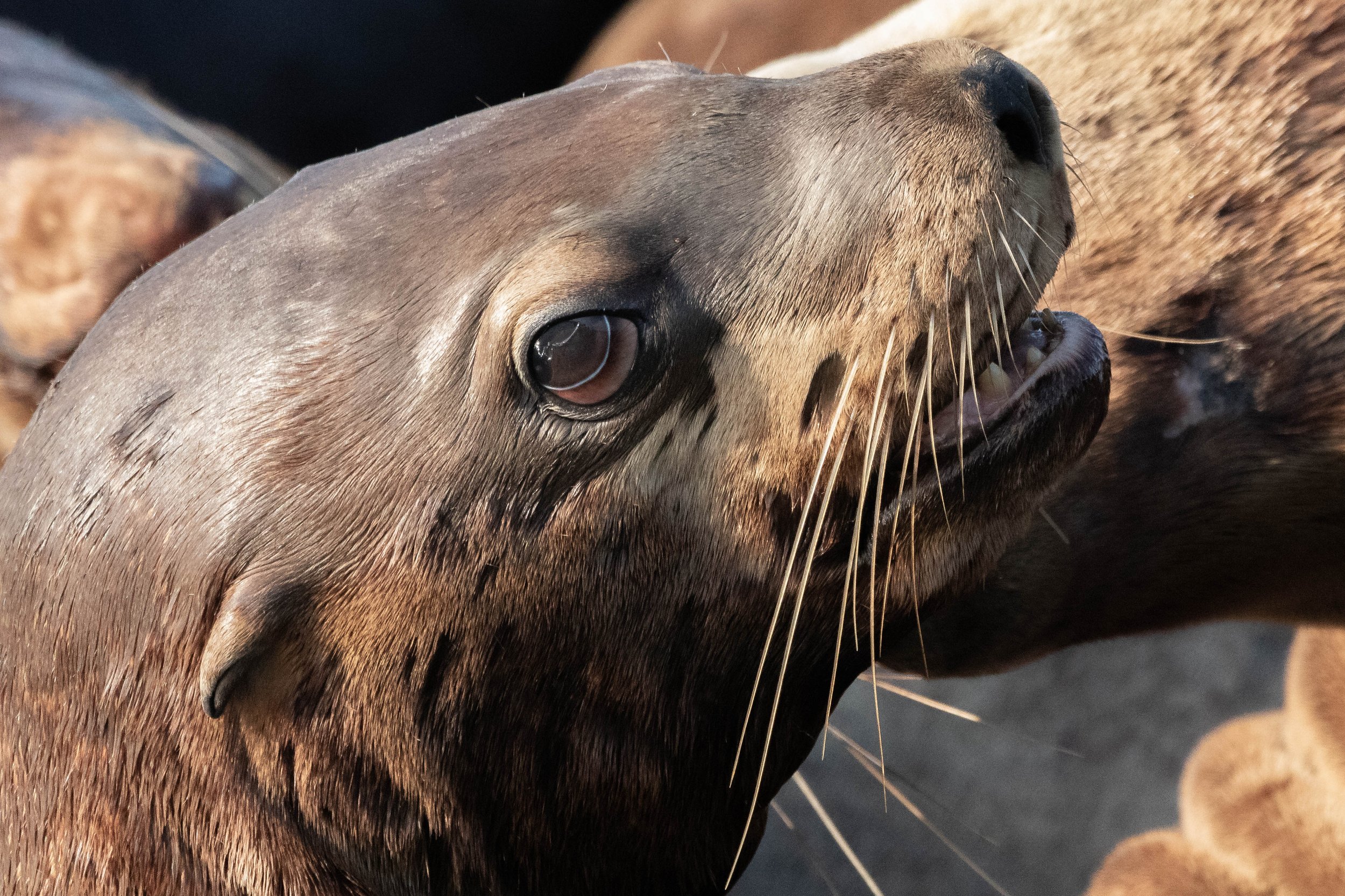August 7, 2024, 3:30 PM - Hump day!
It was another fantastic day to be out on the water! The weather was beautiful and the water was relatively flat and calm as we made our way out of the harbour. Our 3 boats split up to cover a little more ground making it easier to find some whaley big friends. Luck was on our side as we found multiple sets of whales on this afternoon’s tour.
The first set of whales we encountered were 3 adults - Graze (BCY0523), Frankenstein (BCX1358) and Mantis (BCX0936). We got to enjoy the whales socializing by pec-slapping. Pec-slapping is just one of the ways that humpbacks communicate with each other. Other ways they can communicate are with tail slaps, breaching and even singing. That’s right, humpbacks are expert vocalists! When Fall rolls around males will begin warming up their lungs in preparation for heading to their breeding grounds. It’s here that the songs will mostly be sung as they try to woo the ladies. Males will sing to females in large choral groups, and will often change their songs from year to year. Older males may teach the younger males the “new” song for the year here in the feeding grounds so that they are ready for action in the breeding grounds. Songs can even make their way across the world, as its been reported that songs originating from Australia made their way over to South American populations! These songs can be heard for thousands of kilometres underwater, so if males on the outskirts of either population hear each other, a new song may “hit the charts”! Graze had her last calf in 2023 so she may be receptive to male attention once more when she heads to Hawaii.
Female humpbacks typically produce 1 calf every 2-3 years. It’s a big job giving birth to mini giants! When humpback calves are first born they weigh roughly 2000 pounds! While that may seem big to us, those babies need to work fast to pack on as many pounds as possible before they begin their migration north. As they leave those warm water areas and make their way north, they come into orca territory. This is something Graze is all too familiar with. Looking at her fluke (you can see this in our below photos) and pectoral fins it’s very clear that she has had an unpleasant orca meeting. The orca left her with lifelong scars from their teeth known as rake marks. Graze did survive the assault however and has brought back a calf every 2 years since 2019. Fingers crossed she’s already pregnant and will continue the trend bringing us a calf in 2025!
Lucky for our guests they didn’t have to wait until next year to see a baby humpback as the next group of whales we encountered were Zephyr (BCZ0414) and her 2024 calf. This calf may not have run into Orca yet but it appears it’s met a different foe. When you look through the photos, you may notice circular scars on the calf’s back and even a round hole through the fluke. We believe that these are from a much smaller predator called a Cookie-cutter Shark. These tiny sharks live in warmer waters and are prevalent off the Hawaiian coast where the calf was born. This parasitic shark comes up from the depths to latch on to its prey. From there it removes a circular chunk of flesh and leaves. As brutal as this sounds, whales have a miraculous ability to heal and this shouldn’t affect that calf long term. This little guy was full of energy today, and we got some baby pec slaps, cartwheels and general tomfoolery. We love baby season!
As if seeing all those whales wasn’t enough, we also got to hang out with harbour seals, stellar sea lions and several bird species. These guys are always a lot of fun to watch, and quickly turn into a fan favourite with guests! One of our boats also stumbled on briefly on one last whale named Orion (BCX1251). This whale used to spend quite a bit of time in our area but in recent years seems to be feeding a little further south. It’s always nice to see a familiar fin you haven’t seen in a while! Pictures from our awesome adventure today can be seen below!
All photos were taken by Naturalists Hayleigh Hilbert, Vanessa Vereschahen, and Val Watson.
Flukes up. Photo by Hayleigh Hilbert
Graze going for a deep dive. Photo by Hayleigh Hilbert
The white lines on Graze are scars left by orca teeth. Photo by Hayleigh Hilbert
A humpback pectoral fin can be 1/3rd the length of it’s body. Photo by Val Watson
Sunset whale with one of our zodiacs. Photo by Val Watson
Orion fluking. Photo by Val Watson
Frankenstein’s fluke. Photo by Vanessa Vereschahen
Water falling from the fluke. Photo by Vanessa Vereschahen
Pec slapping humpback. Photo by Vanessa Vereschahen
We generally see the fluke before they go for a deep dive. Photo by Vanessa Vereschahen
Zephyr’s 2024 calf. Photo by Vanessa Vereschahen
Zephyr 2024 calf’s fluke has a small hole in it. Photo by Vanessa Vereschahen
Zephyr’s dorsal fin. Photo by Vanessa Vereschahen
Zephyr’s calf’s pectoral fin. Photo by Vanessa Vereschahen
Stellar sea lion checking us out. Photo by Vanessa Vereschahen
Steller sea lion male showing off his teeth. Photo by Vanessa Vereschahen
Harbour seal pup checking us out. Photo by Vanessa Vereschahen
Black turnstone spreading it’s wings. Photo by Vanessa Vereschahen
Great blue heron. Photo by Hayleigh Hilbert
The guests on our open boat Keta. Photo by Val Watson
Guests on our open boat Cascadia. Photo by Hayleigh Hilbert





















